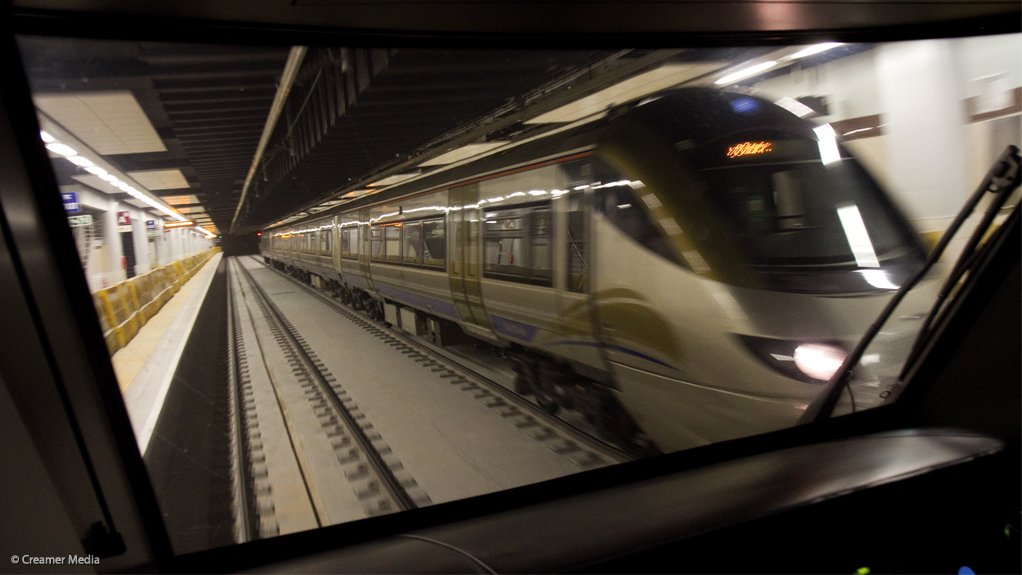The Gautrain Management Agency (GMA) and the Gauteng provincial government “were close to announcing” a R3-billion investment, funded by the Development Bank of Southern Africa, to buy additional rolling stock, build a new depot, and install additional signalling, said GMA chief operating officer William Dachs on Monday.
“We plan to expand the current system. We are close to capacity on our morning and afternoon peak periods,” he noted, speaking at the Southern African Transport Conference in Pretoria.
“Not one cent will come from the provincial fiscus as a capital grant. We are now at the stage where we are mature enough to [look at] additional funding sources. I am so pleased to announce that.”
When considering the national Budget, Dachs was of the opinion that South Africa would most likely spend the next five years “just keeping its head above water”, which made spending on “big new programmes” unlikely.
Prior to his appointment at GMA, Dachs headed up the Public Private Partnership (PPP) Unit at National Treasury.
“The State Budget is really finely balanced . . . it is very, very fragile. What happens when things don’t go according to plan?” noted Dachs.
Should the bill to keep Eskom afloat increase sharply, or the cost of borrowing, or should some unforeseen event occur, then the Budget would have to be redrafted. Any cuts in spending would most likely be on public transport, as National Treasure viewed it “as an effective way to save money”, said Dachs.
“So, what I am saying is that if we continue planning as we are doing, and we don’t look at additional sources of funding, things are not going to change substantially.
“So what do we do? Do we sit down and blame government? Blame the markets and bankers? How can we be more the masters of our own fate?”
One solution was to increasingly target the implementation of PPP projects, stated Dachs.
However, the “biggest disappointment” in the current budget was that PPPs were going to make up 1.2% of the estimated R812-billion to be spent on infrastructure over the next three years, down from 5% in 2011, he noted.
“This means that less than R10-billion to be spent on infrastructure over the next three years will come from the private sector.
“The missed opportunity here is something we have to look at.”
BUSINESS TO FUND RAIL EXTENSIONS?
A possible funding mechanism for the envisaged expansion of the Gauteng rail network, currently undergoing a feasibility study, was land value capture, said Dachs.
The theory was simple, he explained. A good public transport system would attract people, and property values would escalate in a way that would not have happened if the transport system was not there.
“So, it is all about saying to businesses owning property around stations to help invest in the public transport sector. To say: you will gain and the public will gain.”
This principle was applied around the world, he added.
In Hong Kong the metro transport agency was also a property developer.
In Washington, land owners in Tysons Corner in 2004 voted to literally tax themselves, provided a new metrorail line would be extended to their area.
The Washington Post reported in 2005 that property owners in the area were expected, over time, to provide as much as $400-million toward the construction of the metrorail link.
“But the payoff could be greater, not only in convenience and higher property values, but also in the ability to build. Rail’s arrival would put in play the potential for millions more square feet of offices, stores and condominiums,” reported the newspaper.
Dachs said on Monday that a report, yet to be released, indicated that the Gautrain system was adding R2-billion a year to the provincial economy.
“Also, around 250 000 jobs were created as a result of R20-billion in property developments around Gautrain stations.
“Commercial rentals have gone up by as much as 100% in some cases.
“And how much was captured by Gauteng transport department? Or by the Gautrain? Zero.”
EMAIL THIS ARTICLE SAVE THIS ARTICLE
To subscribe email subscriptions@creamermedia.co.za or click here
To advertise email advertising@creamermedia.co.za or click here











